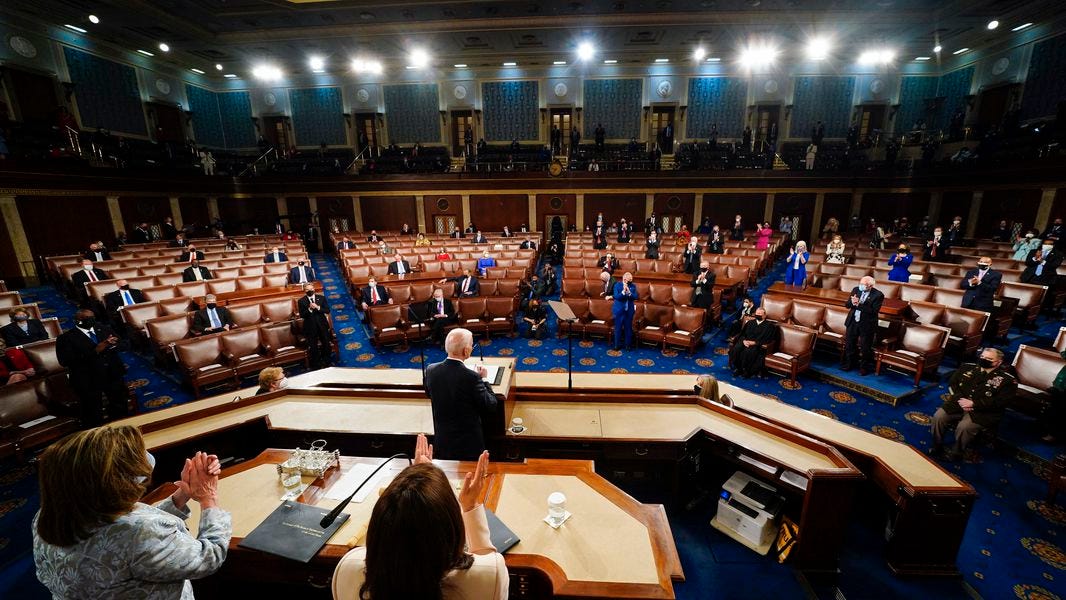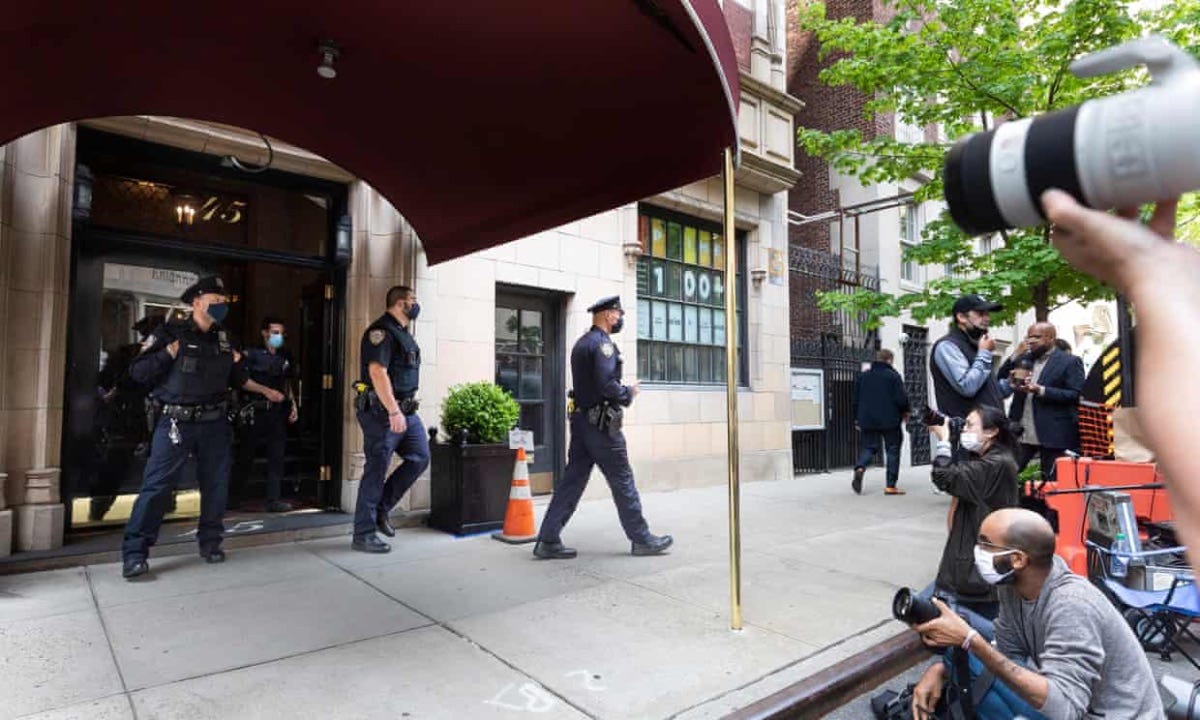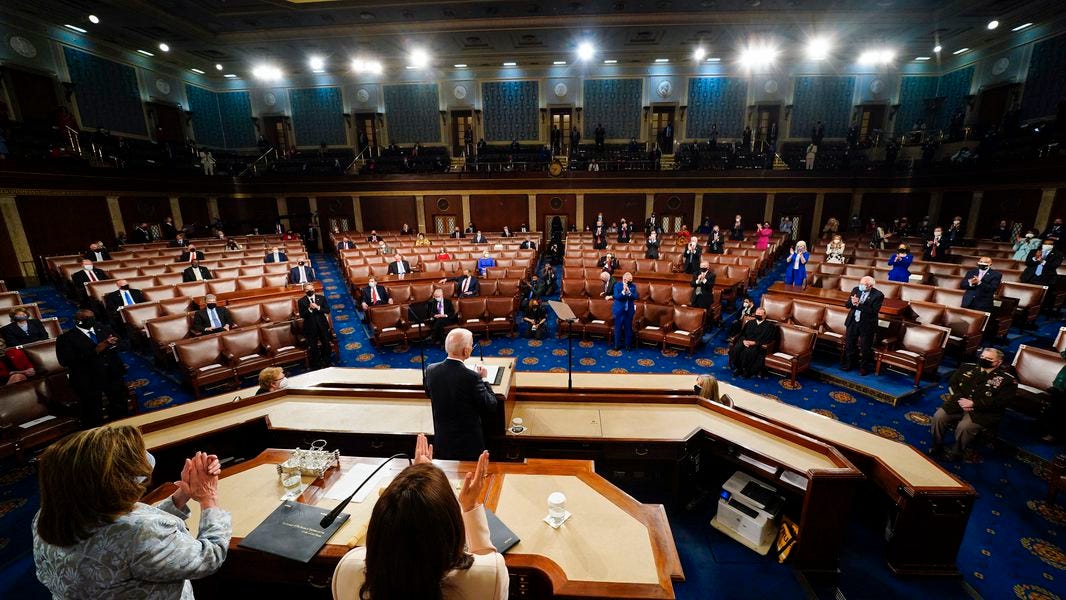Wake Up To Politics - April 29, 2021
Wake Up To Politics: Biden cements his political evolution
Good morning! It’s Thursday, April 29, 2021. Election Day 2022 is 558 days away. Election Day 2024 is 1,286 days away.
Detailing sweeping vision of government’s role, Biden cements his political evolution
On the 2020 campaign trail, Joe Biden often described himself as a “transition candidate,” a moderate Democrat who would seek to foster a return to normalcy and incremental bipartisan compromise.
But in his first speech before a joint session of Congress on Wednesday night, Biden made clear that he now plans to be more transformational than transitional.
Biden’s debut address amounted to a 65-minute sales pitch for the role of government in American life, using his administration’s success in combatting the coronavirus pandemic as proof positive that the United States is in need of a more vibrant government to solve its other problems. (The pandemic was never far from focus, however, as Biden addressed a largely empty chamber composed of a select few lawmakers, masked and socially distanced.)
Describing the large-scale vaccination campaign he has presided over as “one of the greatest logistical achievements this country has ever seen,” Biden then pivoted to laying out his plan to turn the “crisis into opportunity” and lift millions of Americans out of poverty through government intervention.
In Biden’s eyes, the current challenges faced by the U.S. are nothing less than a test of the American system itself, the latest match in the long-running competition between democracies and autocracies. (He singled out China repeatedly throughout the speech as the nation’s foremost competitor.)
“Can our democracy deliver on the most pressing needs of our people?... America’s adversaries, the autocrats of the world, are betting we can’t,” Biden said. “They believe we are too full of anger and division and rage. They look at the images of the mob that assaulted this Capitol as proof that the sun is setting on American democracy.”
“But we have to prove them wrong,” he continued. “We have to prove democracy still works, that our government still works, and we can deliver for our people.”

Standing in the same spot in which another Democratic president declared that “the era of big government is over,” Biden instead emphasized the advancements throughout history “that only the government was in a position to make.” What are the expansive programs that he wants the government to pursue now?
While past presidents have generally devoted their first speech to Congress to a specific issue, Biden’s wish list was long and varied. At the top sat the American Jobs Plan and the American Families Plan, a combined $4 trillion in proposed spending to rebuild America’s roads and bridges, remake the nation’s care economy, combat climate change, and finance two years of pre-school and two years of community college for all Americans by raising taxes on the wealthy.
“Trickle-down economics has never worked,” Biden said. “It’s time to grow the economy from the bottom and the middle out.”
From there, Biden ticked through a number of leading progressive priorities, from an assault weapons ban to comprehensive immigration reform to protections for unions to an expansion of voting rights. (Each face uphill battles for passage in Congress.) Once the Senate’s foremost opponent of court-ordered busing to desecrate schools, who eulogized famed segregationist Strom Thurmond, Biden also demonstrated his evolution on civil rights with an extended paean to the need for equality.
“We have all seen the knee of injustice on the neck of Black Americans,” Biden said, viscerally invoking the murder of George Floyd. “Now is our opportunity to make same real progress... We have a real chance to root out systematic racism that plagues America and American lives in other ways.”
Biden also included nods towards gender equality — noting that he was flanked by two women, Vice President Kamala Harris and House Speaker Nancy Pelosi, in a historic first — and LGBT rights. “To all transgender Americans watching at home, especially young people, who are so brave, I want you to know: your president has your back,” Biden said.

After more than a half-century in public life, 78-year-old Biden underlined Wednesday just how much his political and governmental philosophies have shifted since entering the Oval Office. The metamorphosis extended not just to the agenda he articulated — although it is as sweeping in scope as any president’s in decades — but to how he is likely to enact them.
While Candidate Biden spoke almost non-stop about bipartisanship, making national unity a centerpiece of his campaign, nearly all of the policies President Biden spoke about face universal Republican opposition in Congress. Just as they did with the $1.9 trillion American Rescue Plan, Democrats are increasingly likely to use the one-party reconciliation process to advance Biden’s newest economic packages.
Sen. Tim Scott (R-SC), delivering the traditional opposition response to the president’s address, blasted Biden for abandoning his pledge of bipartisanship. “A president who promised to bring us together should not push agendas that tear us apart,” Scott said, adding that Democrats “won’t even build bridges... to build bridges,” referring to the fight over infrastructure.
But even as he stares down hardened Republican opposition to his agenda, Biden appeared unmoved. “I would like to meet with those who have ideas that are different... I welcome those ideas,” he said. “But the rest of the world is not waiting for us. I just want to be clear, from my perspective, doing nothing is not an option.”
From the Editor’s Desk
I’m committed to keeping Wake Up To Politics completely free and growing only be word of mouth. But to do that, I need your help — and now you can help share WUTP and win rewards at the same time!
Below, find your unique referral link: if three of your friends sign up using the link, you’ll get access to an exclusive Zoom Q&A session with me and other members of the WUTP news team! If 10 friends sign up, you’ll also get a free WUTP mug.
Thank you so much for your help sharing the newsletter. Copy your unique referral link to send to friends: *|RH_REFLINK|*
Or click to share your link directly to Twitter, Facebook, or email.
The Rundown
INVESTIGATIONS
“Federal investigators on Wednesday seized cellphones and computers from Rudolph W. Giuliani, the former mayor of New York City who became President Donald J. Trump’s personal lawyer, stepping up a criminal investigation into Mr. Giuliani’s dealings in Ukraine, three people with knowledge of the investigation said.” New York Times
CONGRESS
“Congressional Democrats are planning to pursue a massive expansion of Medicare as part of President Biden’s new $1.8 trillion economic relief package, defying the White House after it opted against including a major health overhaul as part of its plan.” Washington Post
Biden Administration
“The U.S. Justice Department has repealed a policy put in place during Donald Trump’s presidency that cut off hundreds of millions of dollars in grants to sanctuary cities that limit cooperation with federal immigration authorities.” Reuters

Legal Roundup
Top stories from the legal world, written weekly by Anna Salvatore.
The Supreme Court heard a momentous case on Wednesday about students’ First Amendment rights. The question was whether a Pennsylvania high school can suspend a student for Snapchat messages she sent at home. The case will have broad implications for the expressive rights of students, the scope of the landmark opinion Tinker v. Des Moines (1968), and the ability of schools to regulate off-campus activities like cyberbullying.
During oral arguments, the justices asked tough questions of the attorney representing the school district. Chief Justice John Roberts asked if schools can regulate off-campus speech about religion or politics, and Justices Elena Kagan and Samuel Alito expressed concern about letting schools determine what will be “potentially disruptive.” Notably, though, Justice Stephen Breyer may have spoken for his colleagues when he said he was “frightened to death” of creating a bright-line rule in this case. The final decision, which could be a narrow one, will likely be released early this summer.
The justices agreed on Monday to hear the biggest Second Amendment case in more than a decade. Next term, they will decide whether New York can require gun-owners to show “proper cause” before obtaining a license to carry concealed firearms. In the challengers’ view, this restriction violates their Second Amendment right to self-defense. In New York’s view, the ban “is consistent with the historical scope of the Second Amendment and directly advances New York’s compelling interests in public safety and crime prevention.” Court-watchers expect the Supreme Court to greatly expand the scope of the Second Amendment in its ruling. After all, even if Chief Justice Roberts is unwilling to overturn any more gun safety laws, Justice Amy Coney Barrett — the court’s newest member — will almost certainly serve as the critical fifth vote against New York.
Also on Monday, the Justice Department announced that it will investigate the Louisville, Kentucky metropolitan police, which was responsible last March for killing Breonna Taylor. According to Attorney General Merrick Garland, the DOJ’s Civil Rights division will explore whether the Louisville police engage “in a pattern or practice of using unregulated or unreasonable force.” Just last week, Garland announced the beginning of a probe into the Minneapolis Police Department in the wake of Derek Chauvin’s conviction. Both inquiries could lead to agreements between the Justice Departments and local governments over police reform, according to the New York Times.
More legal news, via Anna:
On Tuesday, the 9th Circuit upheld the constitutionality of delayed trials during the “unique circumstances” of the global pandemic.
SCOTUSblog analyzed two important challenges to state abortion laws, both of which may reach the Supreme Court next term.
In a unanimous opinion last Thursday, the justices limited the Federal Trade Commission’s power to compensate consumers who were deceived by companies.
The 8th Circuit mandated a jury trial within the next six months about whether St. Louis police officers can use chemical agents on protesters.
Daybook
What’s happening in Washington today. (All times Eastern.)
President Joe Biden will receive his daily intelligence briefing at 9 a.m. He will then travel to Georgia, along with First Lady Jill Biden. After arriving at Jimmy Carter Regional Airport, the Bidens will meet with former President Jimmy Carter and former First Lady Rosalynn Carter at 1:25 p.m. in Plains.
At 6 p.m., the (sitting) president and first lady will participate in a drive-in car rally in Duluth to celebrate the 100th day of the Biden presidency. After the rally, they will depart Georgia, arriving back at the White House at 9:20 p.m.
Vice President Kamala Harris will travel to Baltimore, Maryland. At 2:20 p.m., she will tour a Covid vaccination site at M&T Bank Stadium. At 2:55 p.m., she will deliver remarks to mark the administration’s 100th day. She will then return to Washington, D.C.
Secretary of State Antony Blinken will hold a virtual meeting at 1 p.m. with the board of directors of the Committee to Protect Journalists.
White House Principal Deputy Press Secretary Karine Jean-Pierre will hold a press gaggle aboard Air Force One during the flight to Georgia.
The Senate will convene at 10 a.m. Following Leader remarks, the chamber will resume consideration of S.914, the Drinking Water and Wastewater Infrastructure Act, a bipartisan bill to invest more than $35 billion in water resource development projects and increase funding for the EPA’s lead reduction program.
At 11:30 a.m., the chamber will vote on three Republicans amendments to the measure and one Democratic amendment. At 1:45 p.m., the Senate will hold a vote on final passage of the bill, following two minutes of debate equally divided between the parties.
The Senate Armed Services Committee will hold a hearing at 9:30 a.m. on worldwide threats. Director of National Intelligence Avril Haines and Defense Intelligence Agency (DIA) Director Scott Berrier will testify.
The Senate Commerce, Science, and Transportation Committee will hold a confirmation hearing at 10 a.m. for Dr. Eric Lander, who has been nominated to be Director of the White House Office of Science and Technology Policy (OSTP). President Biden has indicated plans to elevate the position to Cabinet-level status; Lander is one of two Cabinet-level officials, along with the as-yet-unnamed OMB Director, who have yet to be confirmed.
The House is not in session.
House Speaker Nancy Pelosi will hold her weekly press conference at 10:45 a.m.
The House Appropriations Committee will hold a subcommittee hearing at 10 a.. on the Justice Department’s response to violent extremism and domestic terrorism in America. Experts from the DOJ and FBI will testify.
The House Science, Space, and Technology Committee will hold a subcommittee hearing at 11 a.m. on what NASA hope to learn from its Perseverance rover, which landed on Mars in February. Scientists from NASA, MIT, and other institutions will testify.
The Supreme Court may announce opinions at 10 a.m.
Former Vice President Mike Pence will give the keynote speech at a dinner hosted by the Palmetto Family Council, a conservative group in South Carolina, at 7 p.m. It will be Pence’s first public address since leaving office; it will also be his first visit to an early presidential primary state as he eyes a possible 2024 bid for the White House.
Thanks for waking up to politics! If you enjoy reading this newsletter, I’d be so grateful if you’d consider donating to help support me and my work. If you want to show off your support for Wake Up To Politics, you can also buy some merchandise.
Also: don’t forget to tell your friends and family to sign up for the newsletter at wakeuptopolitics.com. And if you have any questions or comments, feel free to email me at any time.




